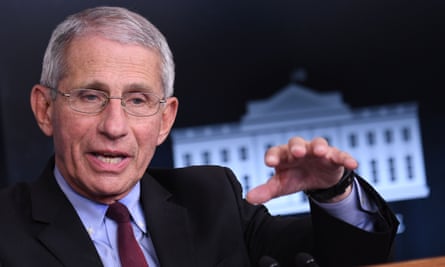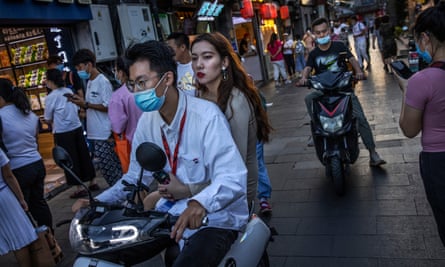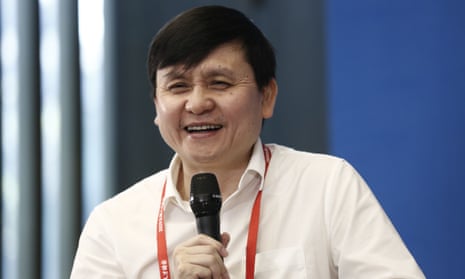Early last year, as Covid-19 began to disrupt livelihoods in Shanghai, local media struggled to persuade the public to stay at home. Then they turned to an infectious diseases expert, Dr Zhang Wenhong, who also heads up Shanghai’s expert panel on Covid-19.
“You’re bored to death at home, so the virus will be bored to death, too,” Zhang said in rapid-fire mandarin mixed with a distinctive Shanghainese accent. “Stay at home for two weeks … then we’ll be an inch closer to success.”
Zhang’s vivid and urgent plea to the public immediately captured the imagination of the city of 25 million, winning him nicknames such as “Daddy Zhang”. The video was widely shared in Shanghai’s online portals, and was even re-published by the state news agency Xinhua in Beijing.
On 10 September, shortly before a new outbreak began in the south-eastern Fujian province, Zhang told a group of students in Shanghai that China was “still facing tremendous challenges” in tackling Covid-19. “We are now maintaining a very active yet cautious strategy to not allow the epidemic to spread in China.”
Since last year, 52-year-old Zhang has become the face for China’s battle against the virus. He’s now one of the country’s best-known and most-respected medical experts, with nearly 4 million followers on Weibo and countless memes on WeChat. International media call him “China’s Dr Fauci” – even though he does not hold the kind of public position in China that the chief medical adviser, Anthony Fauci, does in the US.
But like Fauci, whose communication style made him stand out amid the chaos of the Trump administration’s response last year, Zhang’s adroit use of language and respectful manner when speaking to the public marked him a refreshing departure from the way Chinese officials often carry themselves in public.
It’s rarer, analysts say, for someone who rose from within the system to act in such a manner in today’s China, where the public discourse is filled with rising nationalism, foreign conspiracies and confidence in the superiority of its own political system.
“We don’t often see such a technocrat speak to the public in this way in China,” said Prof Zhengming Chen of Oxford University, who attended the same Shanghai university as Zhang. “It’s not easy to be so frank these days, but Zhang understands that as an expert he has the obligation to speak common sense and to communicate with the general public in plain language.”
Yanzhong Huang, of the Council on Foreign Relations in New York, agrees. “He fits neatly into the Chinese public’s expectation of a traditional intelligentsia. He’s done some important work in public health, but he became famous largely by being himself and telling the truth.
“It’s also a reminder to the authorities in Beijing that in order to fully persuade your public, you have to go back to the basics,” Huang added.

Last year, when Chinese and foreign experts were engaged in a row over whether Remdesivir or Chinese medicine was more effective in preventing Covid, Zhang implied in an interview that there was no point in such a politicised argument. “As the old saying goes, to see whether it’s a mule or a horse, take it out for a walk,” he said.
Zhang’s skills of persuasion, as well as China’s strict “zero tolerance” virus containment strategy, paid off. By June last year, official figures showed that there were only 350 locally transmitted cases in Shanghai. And for most of last year, Chinese citizens enjoyed a largely virus-free life.
Yet Zhang’s popularity does not derive only from his unique ability to persuade. Shortly after he became a household name in Shanghai, a city he immigrated to at a young age from a nearby province, his fans compiled a list of “golden quotes” that revealed his oratory skills and his character.
Once, in explaining what “limited people-to-people transmission” was like, he used the example of a woman infected with avian influenza, who was taken better care of by her mother than by her husband. “As a result, she’s more likely to pass the virus on to her mother, rather than her husband,” Zhang said. “At that very moment, I lost faith in romantic love.”
In the same talk, Zhang tried to explain to his audience the difference between a cold and a flu virus, because the two words sound similar in Chinese language. He said: “Influenza is not a cold, just like a tiger is not a cat.”
When telling the public not to share food on the same plate – a Chinese custom – last year, he said: “Separating the food is not what we are advocating, but it’s something that you must do. If you do not separate your food, it’s like you are running naked in front of the disease – very dangerous.”

In another interview with the English-language China Daily newspaper, Zhang was asked about his legacy. He responded: “when the pandemic is over … I will also silently leave.” He explained further in a separate Shanghai TV interview last year: “Fame only reduced the joy in my life.”
Zhang’s ability to explain complex matters also won him respect from senior figures. Last year, after speaking to US-based Chinese students, Zhang received a handwritten note from Cui Tiankai, then China’s ambassador to the US. Cui, who was born in Shanghai, praised Zhang’s “down-to-earth” style, and promised to pay him a visit when he next returned to his home town.
However, with celebrity status comes scrutiny and divided opinion. On 29 July, as the highly infectious Delta variant began to circulate in China, Zhang posted on social media calling for the “wisdom” of long-term coexistence with the virus – an approach adopted by countries such as Britain and Singapore.
That candid essay drew Zhang into the firing line. Some online commenters accused him of “pandering to foreign ideas” and being “a US lacky”. Gao Qiang, a former health minister, also weighed in, with a lengthy article published in People’s Daily. Gao – without naming Zhang – criticised western countries’ laissez-faire “living with the virus” approach and urged: “We absolutely cannot repeat their mistakes.”
On 14 August, a new post began to emerge on Weibo, accusing Zhang of plagiarising a part of his PhD dissertation 21 years ago. His alma mater, Fudan University in Shanghai, quickly issued a statement, saying they had begun investigating the matter.

Critics of Zhang said that he was “an academic fraud” who had gone too far to criticise the government’s “zero tolerance” policy.
But his supporters fiercely and openly defended him, alleging that such accusations must have been manipulated by those who wanted Zhang out of the picture.
A slew of essays began to pop up on social media immediately after the incident emerged. One wrote: “If a society cannot even tolerate a Zhang Wenhong, then it’s the misfortune of a nation”. Another wrote: “The people protecting him will not deny any criticism of him just because they like him. They do not think it is fair that someone tries to discredit him just because that person disagrees with his views.”
While the row went on, official locally transmitted cases had been dropping to single digits daily. On 23 August, China reported zero locally transmitted symptomatic cases nationally for the first time since July – a further sign that Beijing is unlikely to alter its “zero tolerance” Covid policy.
Zhang did not respond to Gao’s remark and opponents’ attacks online directly. But he finally broke three weeks of silence on 18 August: “The Covid-19 strategy our country has adopted is one that suits us the best at present … You have to try the shoes on yourself to know whether they fit properly,” he wrote on Weibo.
Five days later, Fudan University said in a statement that an investigation had found “no evidence of academic misconduct”.
